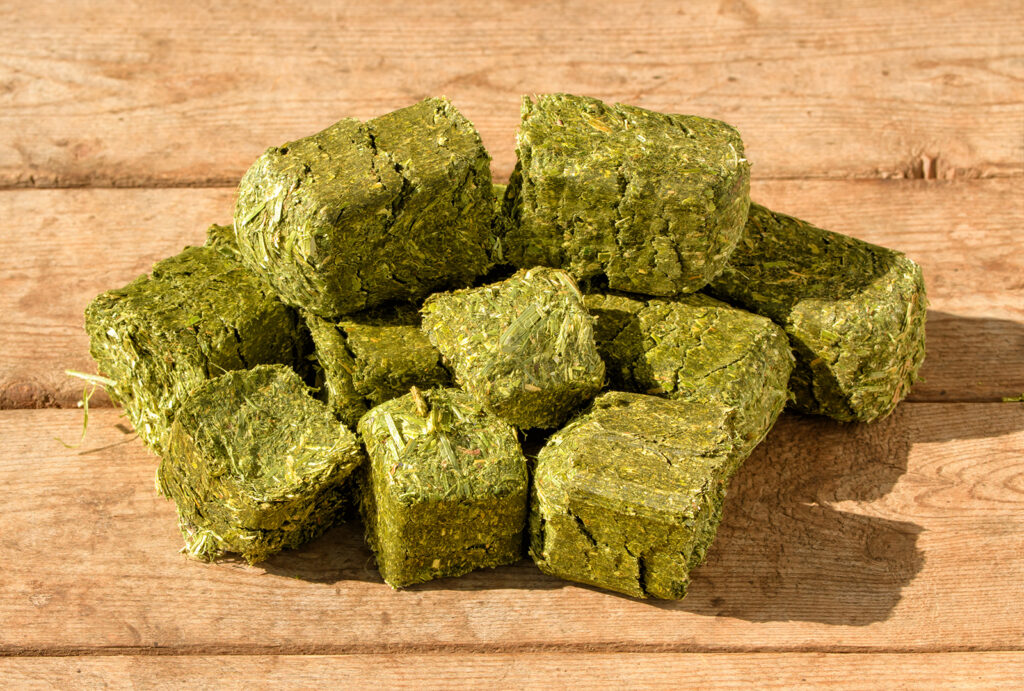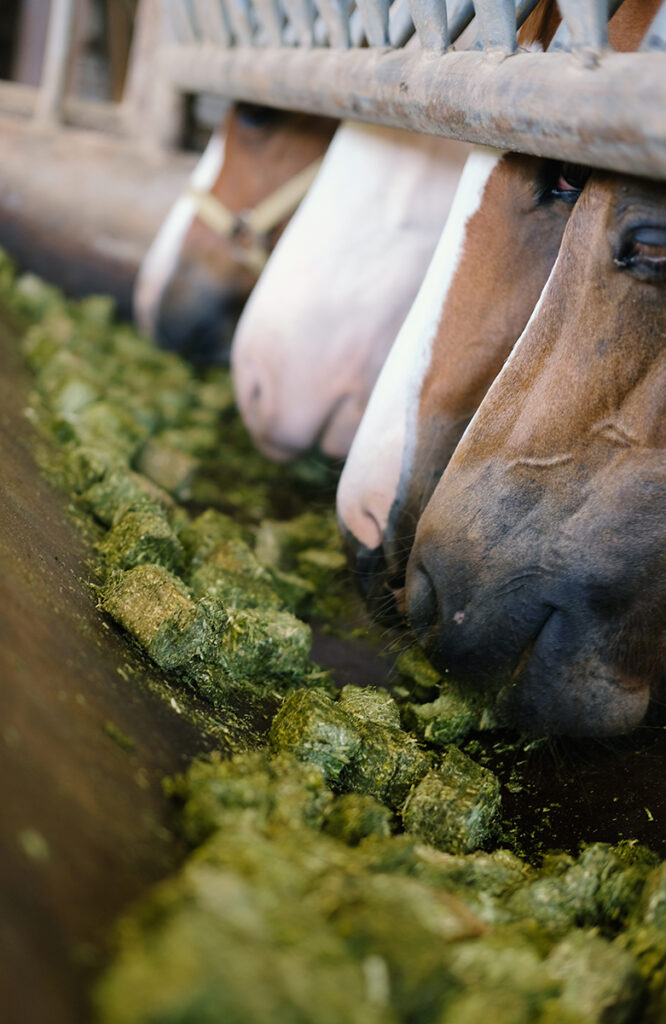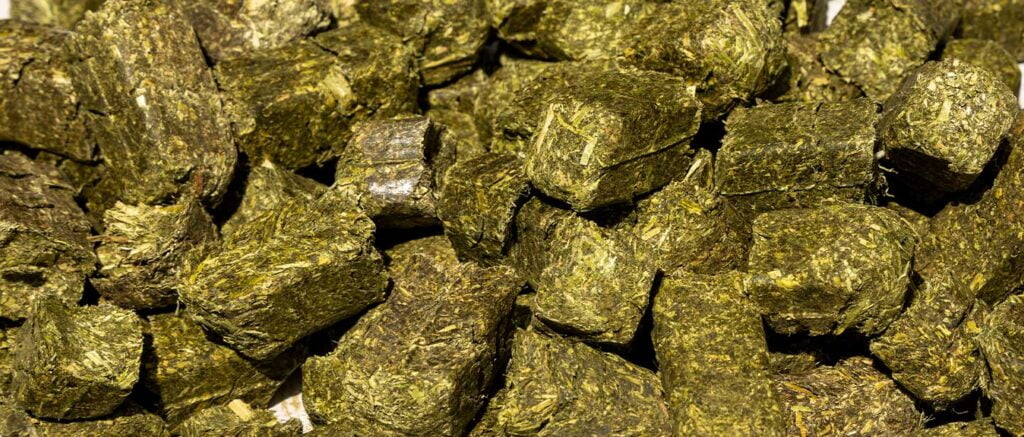Horses can be fed with alfalfa cubes in a convenient and healthy way. These cubes have gained popularity as a feed option among horse owners and trainers thanks to their high protein and energy content. Alfalfa cubes have a dietary role to play in horse nutrition; it’s important to recognize this role when feeding horses.
Advice on How to Store Alfalfa Cubes for Horses
To make sure horses are fed the most nutrient-dense feed, alfalfa cubes must be stored properly. Purchase high-quality, mold- and insect-free alfalfa cubes.
Alfalfa cubes for horses should be stored in a dry, well-ventilated area protected from animals and insects. Do not feed this product if it is moldy, spoiled, infested, or contaminated as it may cause illness or death to your animals. The best way to store cubes to prevent spoilage is in airtight containers. The purchase date should also be written on the containers’ labels.
Regularly inspecting the cubes for signs of spoilage is also important. The cubes must be thrown away if they smell musty or look faded. To ensure that the oldest cubes are used first, it is also crucial to rotate the product.
Understanding Alfalfa Cubes’ Role in Horse Nutrition
The importance of alfalfa cubes in the overall diet of horses must be taken into account when feeding. Protein, energy, vitamins, and minerals found in alfalfa cubes are crucial for keeping horses in good health. While alfalfa cubes’ protein can help increase muscle mass and performance, the cubes’ energy is essential for maintaining weight and strength. Alfalfa cubes for horses contain significant amounts of vitamins and minerals that support strong bones and joints.
Alfalfa cubes are also an excellent source of fiber, which aids in maintaining a healthy digestive system. Horses can consume more nutrients from their food because fiber helps to slow down the digestive process. In addition, fiber helps horses feel fuller for longer, which can lessen the likelihood that they will overeat. Last but not least, alfalfa cubes are an excellent source of antioxidants that can help shield horses from the harmful effects of free radicals.
By ensuring that they are fed in the proper amounts, alfalfa cubes’ nutritional value can be maximized. Amounts may differ based on the breed and size of the horse. To determine the best amount to feed based on the horse’s health and activity levels, we recommend you consult with your veterinarian or equine nutritionist.
The quality of the alfalfa cubes must also be taken into account, in addition to the quantity fed. Alfalfa cubes for horses should be free of mold, dust, and other contaminants. To guarantee that the cubes stay fresh, they should also be kept in a cool, dry environment.
Alfalfa Cubes: A Convenient Hay Alternative
Due to their practicality and high nutritional value, alfalfa cubes have gained popularity as a horse feed option. Alfalfa cubes are simple to store and transport, unlike hay, which is heavy and difficult to store. They are thus a practical choice for time-pressed horse owners who do not have the means to haul or bale hay. Due to their nutrient-dense composition, alfalfa cubes for horses don’t need any additional supplements.

For horses with particular food preferences, alfalfa cubes are a great option. Alfalfa cubes can be fed dry or soaked and have a lower likelihood of containing dust and mold, which can be an issue with hay. This makes them a fantastic choice for horses who have breathing problems.
Benefits and Drawbacks of Alfalfa Cubes for Horses
Convenience, high nutritional value, and simple storage are just a few of the advantages of alfalfa cubes. However, using them also has some disadvantages. The main drawback of alfalfa cubes is that they can contain a lot of calories, which, if given in excess, could result in horses gaining weight. It may be necessary to supplement when feeding alfalfa cubes because of the lack of some nutrients.
Depending on the quality and quantity bought, alfalfa cubes may be more expensive than hay, which is another potential drawback. For horses with respiratory problems, alfalfa cubes are an excellent choice as they contain less dust and mold than hay.
A Healthy Horse Treat: Alfalfa Cubes
As a healthy treat for horses, alfalfa cubes can also be used. In addition to tasting good, they offer many of the same nutrients as hay with less bulk and storage requirements. It’s crucial to spread out the feeding of treats throughout the day and to keep daily amounts to a minimum. Horses are kept fuller for longer periods of time, and this helps to prevent overeating.
Alfalfa cubes are another excellent source of vitamins and minerals, including calcium, phosphorus, and magnesium. They are also a fantastic source of fiber, which helps maintain the health and proper function of horses’ digestive systems.
How to Feed Horses Alfalfa Cubes
Following the correct safety precautions is crucial when feeding alfalfa cubes to horses. Before feeding, always check the cubes for signs of mold or insect infestation and throw away any that appear questionable. Alfalfa cubes should also be added gradually to a horse’s diet to give their hindgut time to adapt. While being fed alfalfa cubes, horses should always have access to fresh, clean water.
The horse’s consumption of alfalfa cubes must also be observed. In addition, horses shouldn’t only eat alfalfa cubes as a source of nutrition. To make sure the horse is getting all the essential nutrients, a balanced diet of hay, feed, and other supplements should be offered.
Alfalfa Cubes for Horses: Advantages and Disadvantages
Alfalfa cubes provide a quick and wholesome feed option for horses, which is one of their many advantages. The cubes offer important nutrients, are very palatable, and are simple to transport and store. They make a great hay substitute and can be fed dry or soaked. This is especially important for senior horses or those with dental issues. Horses can also enjoy alfalfa cubes as a treat while still contributing to a healthy diet.
Horses can get a lot of fiber from alfalfa cubes, which keeps their digestive systems functioning properly. The cubes are an excellent source of protein, vitamins, and minerals, all of which are crucial for a horse’s general health and well-being. Because they are simple to feed and can be used as a top dressing for other feeds, alfalfa cubes for horses are a fantastic way to add extra nutrients to a horse’s diet.
Using Alfalfa Cubes to Navigate the Complexities of Horse Nutrition

Every horse has different nutritional requirements, which is an important point to keep in mind when giving alfalfa cubes to them. Before adding alfalfa cubes to a horse’s diet, it is always best to speak with a veterinarian or equine nutritionist. This will allow the right amount to be fed based on the horse’s size and level of activity. Every horse has different taste preferences, necessitating a trial-and-error approach to the introduction of alfalfa cubes.
High-quality alfalfa cubes are available from Seminole Feed as a practical and wholesome forage alternative. Alfalfa cubes for horses have many advantages, such as a high protein and energy content, necessary vitamins and minerals, and fiber to support a healthy digestive system.
Seminole Feed’s alfalfa cubes can maximize the nutritional value for horses with the right storage and feeding practices. To experience the advantages of this wholesome and practical feed choice for your horses, we invite you to try our alfalfa cube product.


